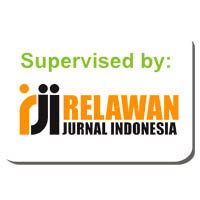KRITIK WACANA TAFSIR TENTANG RELASI SOSIAL: UNITY IN DIVERSITY (PERSATUAN DALAM PERBEDAAN)
Abstract
Keywords
Full Text:
PDFReferences
Adams, C. (2014). Bung Karno Penyambung Lidah Rakyat Indonesia, Terj: Syamsu Hadi-Edisi Revisi. Media Pressindo dan Yayasan Bung Karno.
Agustino, L. (2020). Analisis Kebijakan Penanganan Wabah Covid-19: Pengalaman Indonesia,. Jurnal Borneo Administrator, 16(2).
AL-Bukhari, M. bin I. (n.d.). Shahih al-Bukhari. Dar Thauq al-Najat.
Al-Bukhari. Sahih Al-Bukhari, Juz 2. Beirut: Dar Ibnu Kathir, 1987.
Ali, Lukman. Kamus Besar Bahasa Indonesia. Jakarta: Balai Pustaka, 1994.
Al-Jaza’iri, Abu Bakar Jabir. Minhajul Muslim: Pedoman Hidup Ideal Seorang Muslim, Terj. Andi Subarkah. Solo: Insan Kamil, 2008.
Al-Qurthubi, M. (2006). Al-Jami Li Ahkamil Qur’an. Al-Resalah Publishers.
Amin, Husna. Agama Dan Humanitas. Banda Aceh: Ar-Raniry Press, 2013.
An-Naisaburi, M. (2006). Shohih Muslim. Dar At-Thaybah.
Daman, Rozikin. Pancasila Dasar Falsafah Negara. Jakarta: Rajawali Press, 1992.
Daud. (2020). Pandemic Covid-19: Persoalan dan Refleksi di Indonesia; Sosial Distancing dan Budaya Kita,. Yayasan Kita Menulis.
Dimasyqi, A. I. A. F. I. I. K. A. (n.d.). Tafsir Ibnu Kasir, Juz 4, Surah Al Imran 92 s.d An Nisa 23. Sinar Baru Algesindo.
Direktorat Jenderal Pembelajaran dan Kemahasiswaan Kementerian Riset, Teknologi, dan Pendidikan Tinggi Republik Indonesia. Pendidikan Pancasila. Jakarta: Ristekdikti, 2016.
George Ritzer, Douglas J. Goodman. Teori Sosiologi Modern, Terj. Alimandan. Jakarta: Prenada Media, 2004.
HD, Kaelny. Islam Dan Aspek-Aspek Kemasyarakatan. Jakarta: Bumi Aksara, 2005.
Jannah, S. M. (2020). Antisipasi Corona, Jokowi Sebut Kerja, Belajar & Ibadah dari Rumah. https://tirto.id/antisipasi-sebut-kerja-belajar-ibadah-dari-rumah-eFfr
Jirhanuddin. Perbandingan Agama Pengantar Studi Memahami Agama-Agama. Yogyakarta: Pustaka Belajar, 2010.
Kaelan. Filsafat Pancasila: Pandangan Hidup Bangsa. Yokyakarta: Paradigma, 2009.
Kompas. (2020). ronologi-dan-urutan-munculnya-6-orang-positif-virus-corona-di-indonesia. KOMPAS.Com.
Limited, T. E. I. U. (2020). The EIU tracker ranks the quality of policy responses to the pandemic given countries’ risk profiles: Assessing the quality of OECD countries’ responses to Covid-19.
Lukman Ali, Kamus Besar Bahasa Indonesia, Jakarta: Balai Pustaka, Tahun 1994, Hal. 253
Maulana, L. (2017). Kitab Suci Dan Hoax: Pandangan Alquran Dalam Menyikapi Berita Bohong. Wawasan: Jurnal Ilmiah Agama Dan Sosial Budaya, 2(2).
Nafi’, M. Zidni. Menjadi Islam Menjadi Indonesia. Jakarta: Elex Media Komputind, 2018.
Nizar, M. C. (2017). Pemikiran KH. Hasyim Asy’ari tentang Persatuan. Endogami: Jurnal Ilmiah Kajian Antropolog, 1(1).
Notowidagdo, Rohiman. Ilmu Budaya Dasar Berdasarkan Al-Qur’an Dan Hadis. Jakarta: Raja Grafindo Persada, 2002.
Nurpratiwi, M. R. E. dan S. (2021). Hubungan Keberagamaan dan Perilaku Altruistik Mahasiswa. Al-Afkar, 4(1), 83–97. https://doi.org/https://doi.org/10.31943/afkarjournal.v4i1.181
RI, B. (2020). Perilaku Masyarakat Ditengah Pandemi Covid-19. BPS.
Sensusiyati, R. N. R. &. (2020). Analisis Berita Hoax Covid -19 Di Media Sosial D Indonesia. Intelektiva : Jurnal Ekonomi, Sosial & Humaniora, 1(2).
Shihab, M. Q. (2005). Tafsir Al Misbah: Pesan, Kesan dan Keserasian Al Qur’an. Lentera Hati.
Shihab, M. Quraish. Membumikan Al-Qur’an: Fungsi Dan Peran Wahyu Dalam Masyarakat, Cet. 19. Bandung: Mizan, 1999.
Suci Nurpratiwi, Muhamad Ridwan Effendi, A. (2021). Improving Religious Literacy Through Islamic Religious Education Course Based On The Flipped Classroom. Istawa, 6(1), 16–29. https://doi.org/http://dx.doi.org/10.24269/ijpi.v6i1.3107
Wardani, B. (4 C.E.). The Kiwi Way: Strategi Eliminasi COVID-19 Selandia Baru. Global Startegis, 2.
Widodo, S. K. (2012). Memaknai Sumpah Pemuda di Era Reformasi. Humanika, 16(9).
Yassa, S. (2018). Media Publikasi Pendidikan Pancasila dan Kewarganegaraan. Jurnal Citizenship
Zidni M.Nafi’, Menjadi Islam Menjadi Indonesia, Jakarta: Elex Media Komputind, Tahun, 2018, Hal. 36.
DOI: https://doi.org/10.36671/mumtaz.v9i1.1032
Refbacks
- There are currently no refbacks.
Copyright (c) 2025 Iwan Setiawan

This work is licensed under a Creative Commons Attribution-ShareAlike 4.0 International License.





